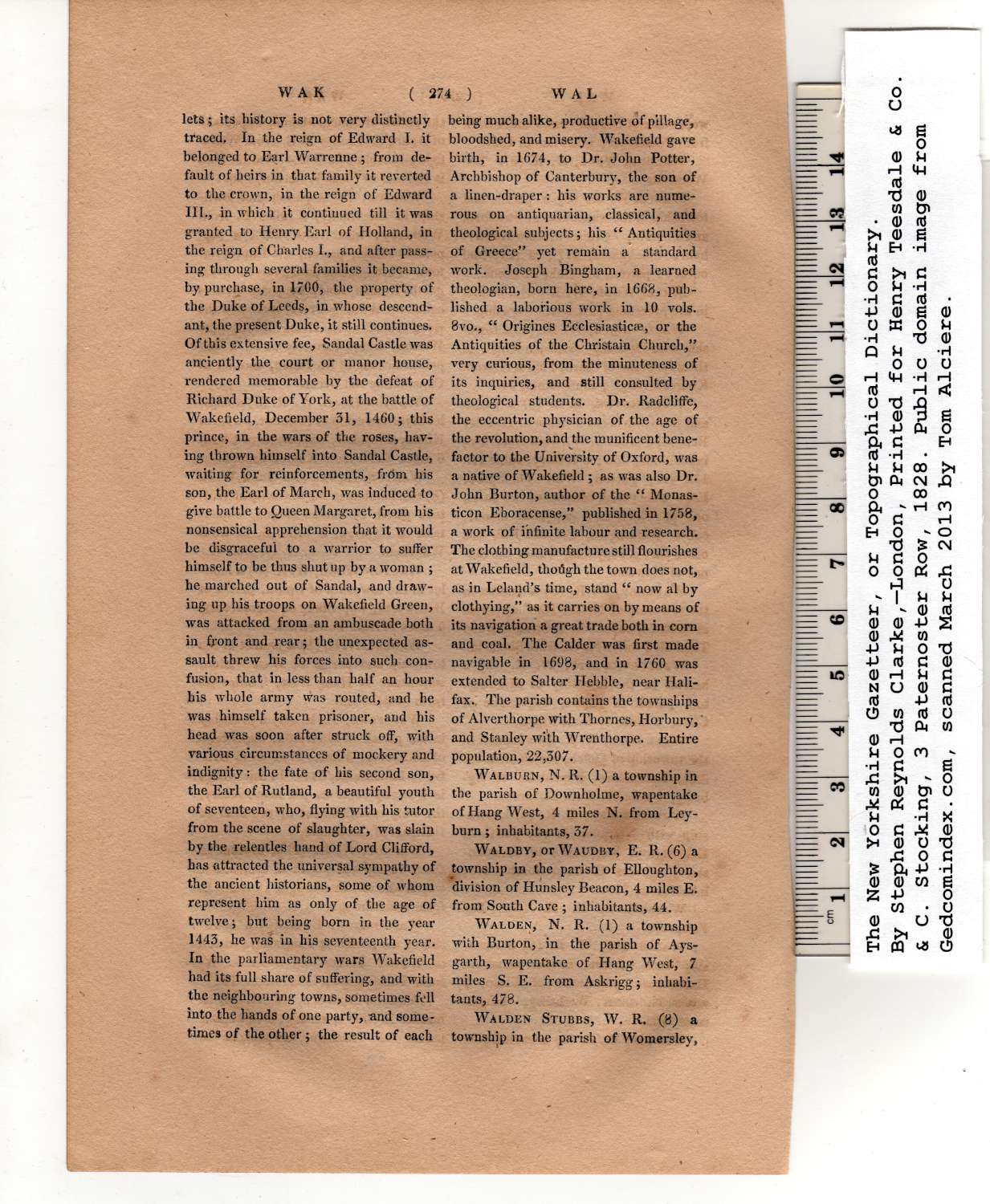|
lets; its history is not very distinctly
traced. In the reign of Edward I. it
belonged to Earl Warrenne ; from de-
fault of heirs in that family it reverted
to the crown, in the reign of Edward
III., in which it continued till it was
granted to Henry Earl of Holland, in
the reign of Charles I., and after pass-
ing through several families it became,
by purchase, in 1700, the property of
the Duke of Leeds, in whose descend-
ant, the present Duke, it still continues.
Of this extensive fee, Sandal Castle was
anciently the court or manor house,
rendered memorable by the defeat of
Richard Duke of York, at the battle of
Wakefield, December 31, 1460; this
prince, in the wars of the roses, hav-
ing thrown himself into Sandal Castle,
waiting for reinforcements, from his
son, the Earl of March, was induced to
give battle to Queen Margaret, from his
nonsensical apprehension that it would
he disgraceful to a warrior to suffer
himself to be thus shut up by a woman ;
he marched out of Sandal, and draw-
ing up his troops on Wakefield Green,
was attacked from an ambuscade both
in front and rear; the unexpected as-
sault threw his forces into such con-
fusion, that in less than half an hour
his whole army was routed, and he
was himself taken prisoner, and his
head was soon after struck off, with
various circumstances of mockery and
indignity: the fate of his second son,
the Earl of Rutland, a beautiful youth
of seventeen, who, flying with his tutor
from the scene of slaughter, was slain
by the relentles hand of Lord Clifford,
has attracted the universal sympathy of
the ancient historians, some of whom
represent him as only of the age of
twelve; but being born in the year
1443, he was in his seventeenth year.
In the parliamentary wars Wakefield
had its full share of suffering, and with
the neighbouring towns, sometimes fell
into the hands of one party, -and some-
times of the other; the result of each
being much alike, productive of pillage,
bloodshed, and misery. Wakefield gave
birth, in 1674, to Dr. John Potter,
Archbishop of Canterbury, the son of
a linen-draper: his works are nume-
rous on antiquarian, classical, and
theological subjects; his “ Antiquities
of Greece” yet remain a standard
work. Joseph Bingham, a learned
theologian, born here, in 1668, pub-
lished a laborious work in 10 vols.
8vo., <e Origines Ecclesiastics, or the
Antiquities of the Christain Church,”
very curious, from the minuteness of
its inquiries, and still consulted by
theological students. Dr. Radcliffe,
the eccentric physician of the age of
the revolution, and the munificent bene-
factor to the University of Oxford, was
a native of Wakefield ; as was also Dr.
John Burton, author of the “ Monas-
ticon Eboracense,” published in 1758,
a work of infinite labour and research.
The clothing manufacture still flourishes
at Wakefield, thofigh the town does not,
as in Leland’s time, stand “ now al by
clothying,” as it carries on by means of
its navigation a great trade both in com
and coal. The Calder was first made
navigable in 1698, and in 1760 was
extended to Salter Hebble, near Hali-
fax. The parish contains the townships
of Alverthorpe with Thornes, Horbury,
and Stanley with Wrenthorpe. Entire
population, 22,307. |
Walburn, N. R. (1) a township in
the parish of Downholme, wapentake
of Hang West, 4 miles N. from Ley-
burn ; inhabitants, 37. „
Waldby, or Waudby, E. R. (6) a
township in the parish of Elloughton,
division of Hunsley Beacon, 4 miles E.
from Smith Cave ; inhabitants, 44.
Walden, N. R. (1) a township
with Burton, in the parish of Ays-
garth, wapentake of Hang West, 7
miles S. E. from Askrigg; inhabi-
tants, 478.
Walden Stubbs, W. R. (8) a
township in the parish of Womersley, |
